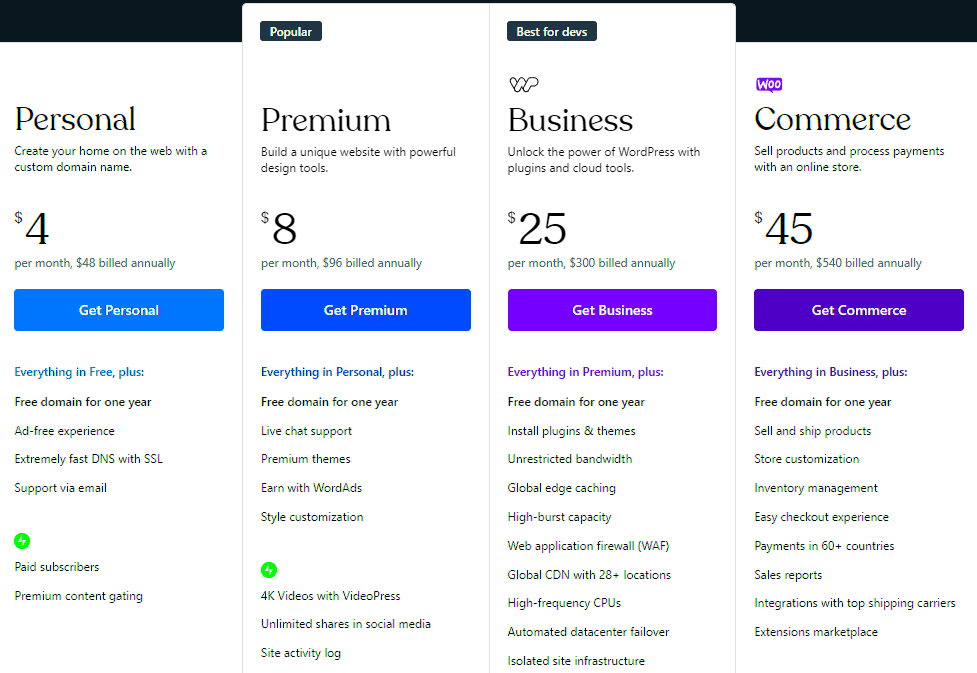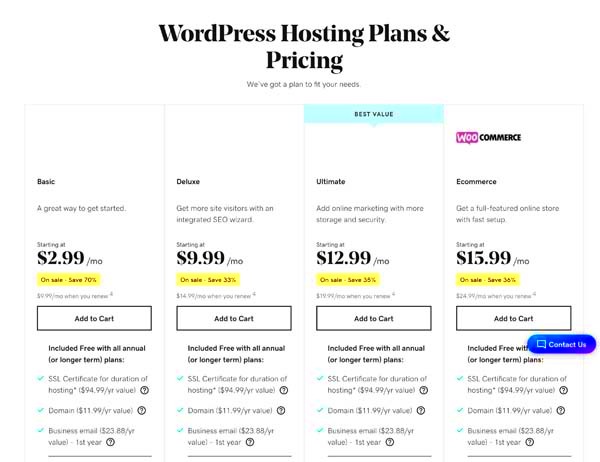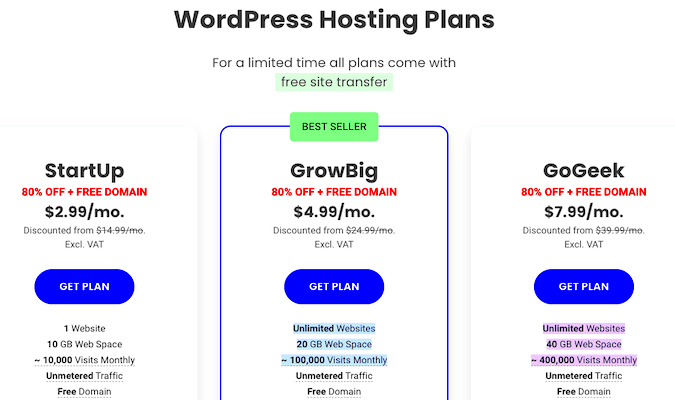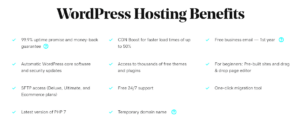When it comes to launching a website, finding the right hosting service is crucial. For WordPress users, understanding the nuances of hosting pricing can be a bit overwhelming. WordPress hosting is not a one-size-fits-all solution; the cost can vary significantly based on the type of service you choose and the features you need. In this article, we’ll break down the costs associated with
Understanding Different Types of WordPress Hosting

Choosing the right type of WordPress hosting can make or break your website’s performance, user experience, and ultimately its success. Here’s a rundown of the most common types of WordPress hosting you’re likely to encounter:
- Shared Hosting:
This is the most affordable option, where multiple websites share a single server’s resources. It’s a great choice for beginners and small sites but may lead to slower speeds during high traffic times.
- VPS Hosting:
A step up from shared hosting, Virtual Private Server (VPS) hosting offers dedicated segments of a physical server. It provides more resources and control, making it suitable for growing sites with moderate to high traffic.
- Managed WordPress Hosting:
This type caters specifically to WordPress users, offering enhanced performance and security. The host takes care of updates, backups, and optimizations, which is perfect for those who prefer to focus on content rather than technical details.
- Dedicated Hosting:
This is the most powerful (and expensive) option, where an entire server is dedicated to your website. It offers maximum performance and security, making it ideal for high-traffic sites or businesses with specific compliance needs.
- Cloud Hosting:
Cloud hosting utilizes a network of servers to host your site, offering scalability and flexibility. It’s a great option for websites that experience fluctuating traffic, as you only pay for what you use.
Each type of hosting comes with its own unique pricing structure, often based on features like bandwidth, storage, and customer support. Understanding these options will help you make a more informed decision tailored to your specific needs.
Factors Influencing WordPress Hosting Pricing

When it comes to WordPress hosting, you might be surprised to discover that a variety of factors can influence the pricing. Understanding these elements can help you make a more informed choice tailored to your needs. Here are some key factors you should consider:
- Type of Hosting: Different hosting types such as shared, VPS, and dedicated servers come at varying price points. Shared hosting is typically the most affordable, while dedicated servers often require a larger budget due to their enhanced performance and resources.
- Performance Features: The speed and performance of your hosting provider can significantly affect pricing. High-performance features such as SSD storage, Content Delivery Networks (CDNs), and caching mechanisms usually come with a higher cost.
- Customer Support: The level of customer support provided can also impact the price. Hosts that offer 24/7 support, live chat options, and extensive knowledge bases often charge more for the additional peace of mind they provide.
- Storage and Bandwidth: The amount of storage and bandwidth you require will determine your hosting costs. If you expect high traffic or store large amounts of media, you might need to opt for a higher-tier plan.
- Renewal Rates: Keep an eye on renewal rates as they can differ from introductory prices. Many hosts offer attractive first-year rates that increase significantly upon renewal.
By considering these factors, you can better navigate the complex world of WordPress hosting pricing and select a plan that fits your budget and requirements.
Comparing Pricing Models: Shared, VPS, and Managed Hosting
Let’s break down the three main pricing models for WordPress hosting: Shared, VPS, and Managed Hosting. Each model has its own unique characteristics, pros, and cons, catering to different audiences.
| Hosting Type | Pricing Range | Best For | Pros | Cons |
|---|---|---|---|---|
| Shared Hosting | $3 – $10/month | Beginners and small websites |
|
|
| VPS Hosting | $20 – $100/month | Medium to large websites |
|
|
| Managed Hosting | $30 – $300/month | Businesses and high-traffic sites |
|
|
Understanding the differences in pricing models is crucial for selecting the right hosting option. Whether you’re a hobby blogger or managing a corporate site, there’s a hosting model that fits your needs and budget!
Typical Price Ranges for WordPress Hosting
When diving into the world of WordPress hosting, you’ll find that prices can vary widely based on the type of hosting you choose, the features you need, and the level of customer support you’ll receive. Here’s a breakdown of the typical price ranges you might encounter:
- Shared Hosting: This is often the most wallet-friendly option, with prices generally ranging from $3 to $10 per month. Ideal for small blogs or personal websites, shared hosting means your site shares server resources with other sites.
- VPS Hosting: A step up in terms of performance and control, VPS (Virtual Private Server) hosting typically runs from $20 to $100 per month. It’s great for growing websites that require more resources and stability.
- Dedicated Hosting: This is the premium option, where you have an entire server dedicated to your site. Prices can start around $80 per month and can soar up to $300 or more, depending on the server specifications and support.
- Managed WordPress Hosting: If you prefer to leave the technicalities to the pros, managed WordPress hosting is worth considering. Prices typically range from $20 to $100 monthly, and it includes automated backups, updates, and support tailored specifically for WordPress.
It’s vital to remember that while some providers advertise low entry prices, costs can climb as you add features or scale your website. Always check what’s included in the hosting plans and calculate potential costs for renewals and upgrades!
Hidden Costs to Watch Out For
When it comes to hosting your WordPress site, some costs aren’t immediately apparent. It’s crucial to be aware of these “hidden” costs to avoid any unpleasant surprises down the road. Here are some common expenses you should keep an eye out for:
| Hidden Cost | Description |
|---|---|
| Domain Registration | Often not included in hosting packages. Expect to pay around $10 to $20 annually for your domain. |
| Renewal Fees | Watch out for increased prices upon renewal. Many providers offer attractive intro rates that jump significantly after the first year. |
| SSL Certificates | While some hosts provide a free SSL certificate, others may charge around $50 to $200 per year for this feature, which is essential for security. |
| Backup Services | If your host doesn’t include backups in the plan, this could increase costs. Expect an additional $5 to $50 per month for this service. |
| Premium Themes & Plugins | Customizing your site could lead to extra costs here, with premium themes ranging from $30 to $100 and plugins varying widely in price. |
By understanding these hidden costs, you’ll be better prepared to manage your WordPress hosting budget. Always read the fine print, ask questions, and ensure you’re fully aware of what you’re signing up for!
Free vs. Paid WordPress Hosting: Pros and Cons
When diving into the world of WordPress hosting, one of the first decisions you’ll face is whether to opt for a free hosting option or to invest in a paid plan. Both have their merits and downsides, but understanding these can help you make an informed choice.
Free WordPress Hosting
Free hosting can be tempting, especially for beginners or hobbyists. Here are some pros and cons:
- Pros:
- Cost: It’s free! Perfect for testing ideas or personal blogs.
- No Commitment: You can dip your toes into the water without a long-term contract.
- Easy Setup: Often, the registration process is straightforward with limited technical requirements.
- Cons:
- Limited Resources: You may face storage, bandwidth limits, and restricted functionalities.
- No Customer Support: Help might be minimal or nonexistent when issues arise.
- Ads and Branding: Free hosts often place ads on your site or include their branding, which can detract from your own.
Paid WordPress Hosting
On the flip side, paid hosting tends to offer more benefits. Check out these advantages and drawbacks:
- Pros:
- Reliability: Higher uptime guarantees and better performance.
- Support: Access to customer support which can save you hours of frustration.
- Customization: More flexibility in terms of themes, plugins, and resources.
- Cons:
- Cost: Monthly fees can add up, especially if you’re on a budget.
- Complex Setup: Some hosting services can be overwhelming for beginners.
In a nutshell, the choice between free and paid hosting largely depends on your needs, future aspirations, and how serious you are about your WordPress site.
How to Choose the Right Hosting Plan for Your Needs
Choosing the right hosting plan can feel like searching for a needle in a haystack. But don’t worry! With the right criteria in mind, you can simplify the process and find a plan that fits your needs perfectly.
1. Define Your Website Type
Are you building a personal blog, a business site, or an eCommerce store? Your website’s purpose heavily influences your hosting requirements. For example:
- Personal Blogs: May thrive on cheaper shared hosting.
- Business Sites: Might require more robust shared or managed hosting.
- eCommerce Sites: Necessitate high-performance plans, perhaps with dedicated servers.
2. Consider Traffic Expectations
How many visitors do you expect to receive? If you anticipate significant traffic, look for hosting plans that offer:
| Traffic Level | Recommended Hosting Type |
|---|---|
| Low (1-5K visitors/month) | Shared Hosting |
| Medium (5-20K visitors/month) | VPS Hosting |
| High (20K+ visitors/month) | Dedicated Hosting |
3. Assess Your Budget
Hosting plans can range from a few bucks a month to hundreds. Consider:
- Initial Costs: What can you afford upfront?
- Long-term Costs: Will you be locked into an annual fee or can you pay month to month?
- Renewal Rates: Check what the renewal fee will be after the initial period.
4. Evaluate Features
Look for essential features such as:
- Storage: Ensure there’s enough space for your needs.
- Bandwidth: Unlimited or high bandwidth is preferable.
- Security: SSL certificates, backups, and malware protection.
Ultimately, the right hosting plan will support your website’s growth while being easy on your wallet. Take your time, do your research, and list out what you need – you’ll find the perfect match before you know it!
Conclusion
Choosing the right WordPress hosting plan is crucial for the performance and reliability of your website. Understanding the various pricing structures available can help you make an informed decision. Here is a recap of some important aspects to consider:
- Types of Hosting:
- Shared Hosting: Generally the most affordable option, ideal for small sites.
- VPS Hosting: Offers more resources and control, suitable for growing websites.
- Managed WordPress Hosting: Provides a fully optimized environment with specialized support.
- Dedicated Hosting: The most expensive option, best for high-traffic and enterprise-level sites.
- Cost Factors:
- Storage and Bandwidth
- Number of Websites Allowed
- Performance Enhancements (e.g., caching, CDN)
- Customer Support Options
- Security Features (backup, SSL)
- Typical Pricing Ranges:
| Type of Hosting | Price Range (per month) |
|---|---|
| Shared Hosting | $2.75 – $10 |
| VPS Hosting | $20 – $100 |
| Managed WordPress Hosting | $15 – $50 |
| Dedicated Hosting | $80 – $300+ |
In summary, WordPress hosting pricing varies greatly based on the type of service, features offered, and your specific needs. Take the time to assess what is essential for your website, compare different hosting providers, and choose a plan that aligns with your budget and goals.



